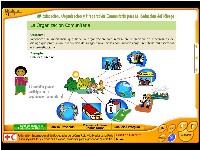Highlights
- The set of manuals sponsored by ProVention is now available in Spanish. Some manuals from the same series have been translated into English
- Powerpoint presentation about the project (Spanish, April 2008)
Related resources
Related Activities
- Community Risk Assessment and Climate Adaptation Tools
- Community based Vulnerability and Capacity Assessment (VCA) in Central America
- Global Risk Identification Programme
- Identification and Analysis of Global Disaster Risk Hotspots
- Tools for Community Risk Assesment and Action Planning
- African Urban Risk Analysis Network (AURAN)
 |
|
Community based Vulnerability and Capacity Assessment (VCA) in Central America |
Update
Project activities in Belize, Costa Rica, Guatemala, and Honduras have recently made substantial progress: in all four countries project communities and schools have been identified, community capacities strengthened, VCA training has taken place, community micro projects have been identified and action plans developed. Fundraising for the micro projects is in progress. Also, four National Forums have been organized with OAS, the last one held in Belize at the beginning of July. All 14 modules of the ‘Better Be Ready’ series have been translated into English and four English manuals have been printed and disseminated outside the region. The translation of the Portuguese version for the first four modules is underway, and will be available online in September. At the beginning of 2008 the Chilean Red Cross withdrew from the initiative as a result of institutional changes. Resources allocated for Chile are now used to support activities in Barra Mansa in Brazil.
Description

This project is a collaborative effort between OAS, IFRC and Red Cross National Societies in Belize, Costa Rica, Honduras, Guatemala, Brazil and Chile aimed at building the capacity of local authorities, Red Cross and communities in Central America in carrying out vulnerability and capacity assessments (VCAs) and developing risk reduction activities at the community level.
Project partners:
- IFRC/Regional Delegation in Panama,
- OAS/Unit of Sustainable Development and Environment,
- RC national societies in Belize, Costa Rica, Honduras, Guatemala Brazil, and Chile .
- PAHO has been invited by IFRC and OAS to collaborate on protecting local health facilities and potable water systems.
- Results and findings from the VCAs are shared with other partners such as the Inter American Development Bank, the Caribbean Development Bank, the Central American Bank for Economic Integration and leading bilateral aid agencies.
- The Centre for Reference and Information on Disasters (CRID) based in San José, Costa Rica, is in charge of the management of the resource materials, publication of the modules and storage and distribution of the risk maps.
Outputs & events
Publications:
The set of six manuals is a collaborative effort between IFRC, OAS, PAHO and UNICEF, supported by ProVention, aimed at promoting community-based disaster risk reduction activities in the following fields:
 |
School Maintenance (pdf, 12.5MB); |
 |
Disaster Mitigation of Rural Water Supplies and Sewerage Systems (pdf, 10.8MB) | ||||
 |
Natural Hazards and School Shelter (pdf, 8.4MB) |
 |
Community Early Warning Systems for Small Valleys (pdf, 12MB) | ||||
 |
Floods Awareness Practice Guides (pdf, 6.9MB) |
 |
Community dialogue on water and climate (pdf, 11.3MB) |
 |
An interactive VCA Toolkit CD ROM has been developed by the International Federation of the Red Cross and Red Crescent Societies in collaboration with the Regional Disaster Information Centre (CRID). |
Four manuals have already been translated into English:
- Education, Organization and Preparation for Risk Reduction
- Prepared Family
- Community First Aid
- Protected School
Network:
A Network has been created around this project consisting of OAS, Federation, UNICEF, PAHO, CRID and at country level Red Cross Societies with their National Partners.
Next Steps
The translation in English and Portuguese of the manuals and the interactive CD ROM is currently under way.
Links
Additional project related information can be found in a powerpoint presentation (April 2008), on the website of the Regional Delegation for Mexico, Central America and the Caribbean of the International Federation as well as on the project website.




